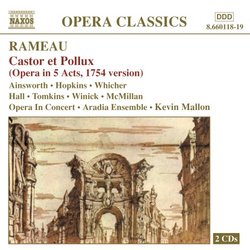| All Artists: Jean-Philippe Rameau, Kevin Mallon, Ensemble Aradia, Meredith Hall, Monica Whicher Title: Rameau: Castor et Pollux (Opera in 5 Acts, 1754 version) Members Wishing: 0 Total Copies: 0 Label: Naxos Original Release Date: 1/1/2004 Re-Release Date: 4/20/2004 Album Type: Box set Genre: Classical Styles: Opera & Classical Vocal, Historical Periods, Baroque (c.1600-1750) Number of Discs: 2 SwapaCD Credits: 2 UPC: 730099611824 |
Search - Jean-Philippe Rameau, Kevin Mallon, Ensemble Aradia :: Rameau: Castor et Pollux (Opera in 5 Acts, 1754 version)
 | Jean-Philippe Rameau, Kevin Mallon, Ensemble Aradia Rameau: Castor et Pollux (Opera in 5 Acts, 1754 version) Genre: Classical
|
Larger Image |
CD Details |
CD ReviewsA Sterling Performance of Rameau's Revised 'Castor & Pollux' J Scott Morrison | Middlebury VT, USA | 06/13/2004 (5 out of 5 stars) "Rameau had a hard-earned reputation as an opera composer and his timing was terrible. He got caught up in the battle between the followers of Lully and those of his own new French school. The battle was, however, pretty much won after Rameau's first opera, 'Hyppolite et Aricie,' written four years before 'Castor et Pollux.' With his second opera in 1737 public opinion swung strongly his direction, but a few years later the strong tide of Italian opera washed ashore and so Rameau and his librettist, Pierre-Joseph Bernard, rewrote the work in 1754. They eliminated the prologue and rewrote the first act, tightening the action and changing the emphasis of the plot somewhat: Castor and Pollux did not, as in the 1737 version, both love the heroine, Telaire, but Pollux was betrothed to her and he, out of brotherly love, gave her up to his brother Castor who WAS in love with her as she with him. [Sidebar: Castor and Pollux were erroneously thought by astronomers to be twins and hence the two so-named stars are the 'Gemini,' but in Greek mythology they were only half-brothers. And thus as mistakes memorialized.] The 1737 version has been recorded two or three times - most remarkably by William Christie's Les Arts Florissant, following up on their amazingly populer recording of 'Hippolyte et Aricie' - but there have been none that I'm aware of of the 1754 version. And it has plenty advantages of its own and certainly deserves a decent recording; it gets that, and more, with this issue from a Canadian group, Aradia, under their director, Kevin Mallon (who had himself participated in the earlier Christie recording). Aradia and the singers involved performed the opera several times in concert and were certainly ready when it came time to record it. From the very first note of the Overture, one can tell that these musicians have the music in their blood. Particularly notable is the solo baroque bassoonist, James Bolyard, whose playing is simply magnificent. The solo singers are uniformly excellent. Telaire, sung by Monica Whicher, sings her 'Tristes apprets,' movingly. Meredith Hall's Phoebe is similarly well-sung. Castor is sung by tenor Colin Ainsworth, Pollux by Joshua Hopkins, whose warm baritone is, I think, destined for great things. The smaller parts are taken by members of the chorus, by and large, and are more than adequate. Mallon's pacing is spot on. There are significant orchestral movements which are played with spirit and tranlucency by the Aradia Ensemble. In fact, my only very minor quibble with this performance is that sometimes I had difficulty distinguishing the voices of Whicher and Hall.This is a necessary recording for all who are interested in 18th-century French opera. Scott Morrison"
|

 Track Listings (20) - Disc #1
Track Listings (20) - Disc #1